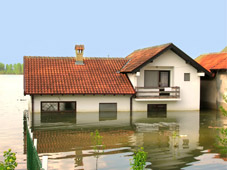 Do you know the flood risks around your home? You might not, but it’s worth finding out. Most properties have flood risks. However, some have a much higher chance of experiencing a flood than others. Those with the highest risks of flooding have the most need for flood insurance.
Do you know the flood risks around your home? You might not, but it’s worth finding out. Most properties have flood risks. However, some have a much higher chance of experiencing a flood than others. Those with the highest risks of flooding have the most need for flood insurance.
What’s Flood Insurance?
Homeowners who live in flood zones should consider buying flood coverage. Think of flood insurance as property coverage in case of floods. It will help you repair or replace damaged property in case of floodwater damage. Indeed, many parties recognize the benefits of flood coverage to the standard homeowner. If you have a home mortgage and live in a flood zone, your lender might even require you to get this coverage.
After a flood, you might find yourself out of luck using your normal homeowners insurance. Often, you have to buy flood insurance as a separate, stand-alone policy. A standard homeowners’ policy likely will not cover this type of protection.
Protecting Your Home In Case Floods Threaten
Still, even if you have flood insurance, you don’t want a flood to damage your property. You will need to take preventative steps to shore up your home. This might include:
- Installing heavy waterproofing around doors, windows, the roof and foundation
- Cleaning and inspecting the home’s gutters
- Ensuring that drainage ditches remain structurally sound
- Incorporating construction techniques in the home to keep water out. For example, some homes build on an elevated floor to let floodwater pass under the home.
Many of these steps you can take during good weather. However, if imminent flooding threatens, there are steps you will need to take right away.
- Invest in sandbags or other artificial dam mechanisms. Placing them around low areas and entryways might help keep water out of the home.
- Turn off your home’s electrical system.
- Assemble an emergency kit. This should include batteries, water, non-perishable food, remote batteries for your phone and other items, medical supplies and a generator.
- Move valuable or large items to elevated places. Usually, moving these items to an upper floor or attic is the most helpful.
- It’s usually best to evacuate your home in advance of the flood. Make sure you take particular valuables with you so that they don’t become lost in the flooding. If you cannot evacuate, move to the highest point of your home.
During and after flooding, listen to the instructions of local authorities. Do not attempt to return home until they give you an all-clear. Once you are there, immediately contact your flood insurance agent to start a claim. Follow their directions to appropriately file, declare and document the damage.